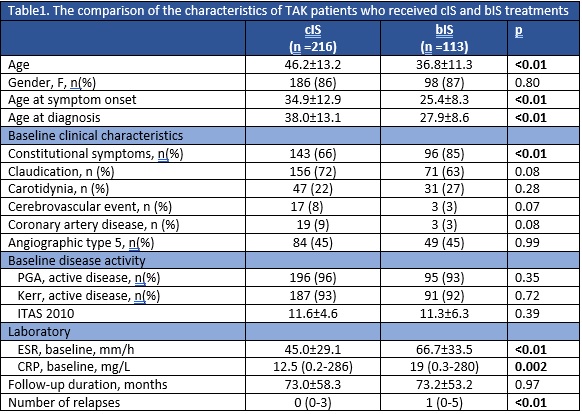Session Information
Date: Monday, November 18, 2024
Title: Vasculitis – Non-ANCA-Associated & Related Disorders Poster III
Session Type: Poster Session C
Session Time: 10:30AM-12:30PM
Background/Purpose: There is no data on which patients biologic immunosuppressive (bIS) treatment should be chosen in Takayasu’s arteritis (TAK). In this study we aimed to assess the characteristics of TAK patients needed biologic treatment during follow-up in daily practice.
Methods: Patients fullfilling the American College of Rheumatology 1990 criteria for TAK and who received conventional ISs (cISs) or bIS were included in this retrospective multicentre study. Demographic and clinical data were collected from patient files.
Results: We included 329 patients (F/M: 284/45) in the study at last visit. The number of the patients who received bIS was 113 (34%)(89 TNF inhibitors, 24 tocilizumab) and who received only cISs was 216 (66%) during follow-up. Mean age at the end of the follow-up was 43.0±13.5 years and mean follow-up duration was 78.7± 65.8 months. Patients who received bISs were younger compared to patients who received cISs (36.8±11.3 vs 46.2±13.2 years, p< 0.01) at last visit assessment. The frequency of constitutional symptoms at baseline visit was higher in bIS group (85% vs 66%, p< 0.01). Also baseline erythrocyte sedimentation rate (ESR) (bIS vs cIS: 66.7±33.5 vs 45.0±29.1 mm/h, p< 0.01) and CRP levels (19 (0.3-280) vs 12.5 (0.2-286) mg/L, p= 0.002) were higher in patients who were given bIS treatments. Number of relapses were higher in patients who needed bISs during follow-up.
Conclusion: In this study, TAK patients with biologic treatment need during follow-up had more frequent constitutional symptoms and higher acute phase reactants with a higher relapse rate compared to patients receiving cIS treatment. Our results may suggest that in young TAK patients with prominent acute phase reactants and constitutional symptoms at diagnosis, biologic treatment may be an option as the first steroid-sparing agent.
To cite this abstract in AMA style:
Kaymaz-Tahra S, Bayindir Tsechelidis O, Ince B, Ozdemir-Isik O, Kutu M, Karakas O, Demirci-Yildirim T, Ademoglu Z, Ediboglu E, Uludogan B, yaşar Bile N, Kasifoglu T, Akar S, Emmungil H, Onen F, Omma A, Alpay Kanıtez N, Yazici A, Cefle A, Inanc M, Aksu K, Keser G, Direskeneli H, Alibaz Öner F. Biological Treatment May Be an Option as First Steroid-Sparing Agent in a Subgroup of Young Takayasu Arteritis Patients with Prominent Acute Phase Reactants and Constitutional Symptoms [abstract]. Arthritis Rheumatol. 2024; 76 (suppl 9). https://acrabstracts.org/abstract/biological-treatment-may-be-an-option-as-first-steroid-sparing-agent-in-a-subgroup-of-young-takayasu-arteritis-patients-with-prominent-acute-phase-reactants-and-constitutional-symptoms/. Accessed .« Back to ACR Convergence 2024
ACR Meeting Abstracts - https://acrabstracts.org/abstract/biological-treatment-may-be-an-option-as-first-steroid-sparing-agent-in-a-subgroup-of-young-takayasu-arteritis-patients-with-prominent-acute-phase-reactants-and-constitutional-symptoms/

